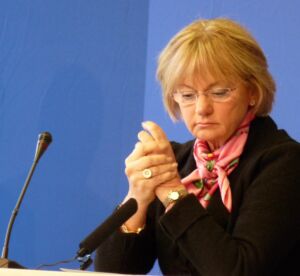News
Politics Round-Up: Pia Kjærsgaard criticises ‘un-Danish’ decision to sell kebabs at football stadium
This article is more than 3 years old.
Ceres Park in Aarhus will no longer be only selling the traditional hotdog at football games, much to Pia Kjærsgaard’s dismay

Pia Kjærsgaard would prefer a sausage over a kebab at football games (photo: Brandsen)
When the Danish-Turkish sixth tier football team Vatanspor played against AGF Aarhus in the Danish Cup yesterday, the stadium sold kebabs along with the traditional hotdog.
The decision to sell kebabs during the match was warmly greeted by most home fans.
However, Pia Kjærsgaard on the other hand was not too happy about the announcement.
Declines invitation to watch game
The Dansk Folkeparti member told TV2 that this is “special treatment towards the Muslims” and something “we do all the time”.
The selling of kebabs at Vatanspor’s home games in Brabrand near Aarhus is a tradition and they won’t let the remarks upset them.
In fact, the club invited Kjærsgaard to come to their next game for free – an invitation she has declined.
PM candidates to debate live on TV
The three candidates running to become Prime Minister – Mette Frederiksen, Jakob Ellemann-Jensen and Søren Pape Poulsen – will meet for a live TV debate on Sunday. An autumn general election still looks likely, and Ellemann-Jensen this week said an early vote made sense for the Blue Bloc given the level-pegging nature of the polls. Radikale has threatened to overthrow the government should Frederiksen not announce a date by October 4. The general election must be held by 4 June 2023 at the latest.
New name for vegan party
Veganpartiet has officially changed its name to Grøn Alliance. It was thought the previous name was too exclusionary. It will appear on the official list as ‘G’. After asking for permission for the name change, it was was approved with the minister of the interior and housing telling TV2 that granting permission was the respectable and right thing to do.
Ellemann disagrees with Pape
Jakob Ellemann-Jensen, the head of Venstre, described the financial plans of Konservative as being unrealistic as a part of the plan includes saving 17.8 billion kroner on public developments. Ellemann-Jensen does not see where the cutting of costs will be found and is afraid that a vote for Konservative would not be “the best for the people or for Denmark.” Søren Pape Poulsen, head of Konservative, contends that the funds will be found by making the public sector more efficient by 0.4 percent annually.
New COVID-19 vaccines to be delivered
Even though the amount of people infected by COVID-19 has fallen over the course of the summer – from week 33 to 34 it fell by 27 percent – vaccinations against COVID-19 will be re-starting on September 15. 4.5 million new variant-updated vaccinations from Pfizer/BioNTech and Moderna will be sent to Denmark in September according to the Sundhedsstyrelsen health authority. The target vaccination group will also be expanded to include people who are pregnant, healthcare workers and those living with people who are more at risk. The jab will be available on September 15 for everyone over the age of 85. And on October 1 everyone over the age of 50 will receive a vaccination invitation via e-Boks.
Konservative: Cash for energy change
Konservative has announced that if they gain power, Danish homeowners will be awarded cash if they are able to make their homes more environmentally friendly and thus cutting energy consumption. According to Konservative head Søren Pape Poulsen, the reward will encourage more people to act and help prevent climate change. It could be by buying new windows, better isolation or adopting heating methods that are better for the environment. The proposed check could be anywhere from 20,000 to 60,000 kroner and the party says there is potential for 600,000 homes in Denmark to save CO2 and reduce their energy use.
Living in Denmark with a foreign partner is getting more difficult
It has become increasingly difficult for Danish citizens married to foreigners to live in Denmark after the laws were changed in 2018. Before then, 10 percent of people were rejected – a figure that has now increased to 18 percent, according to a report by the Immigration Ministry. One out of every five rejected cases relate to levels of written and speaking Danish not being up to standard. It is a requirement to have passed a Danish test equivalent to a 9th grade Danish exam.










































